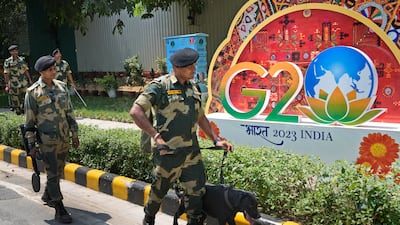For months, India’s big cities have been so heavily festooned with large, green-and-saffron-coloured posters that one might be forgiven for thinking it was an election year. The fever, however, is not political, but rather geo-political. The country has dressed up to welcome leaders from the world’s 19 largest economies and the EU, a grouping known as the G20, at a summit to be held this weekend in New Delhi.
Since its foundation nearly a quarter-century ago, the G20 – which, to be specific, is practically a grouping of those countries’ finance ministries – has become the premier home of discussions on international economic and financial co-operation. After all, its members together account for around 85 per cent of the world’s GDP.
Since the introduction of a summit for heads of government and heads of state into its programme in 2008, the scope of discussions has naturally crept beyond that; the club has become increasingly divided along geopolitical fault-lines that have more to do with superpower rivalries and competing political ideologies than trade. That is very much the case at this year’s summit, from which the Russian and Chinese leaders are expected to be absent – the former over the war in Ukraine and the latter for reasons less clear.
The absence of the leaders of two nuclear powers – one the world’s second-largest economy – will be a blow for diplomats who might have hoped for some top-level efforts to smooth out East-West divisions on the summit’s side lines. The growing gap between the American and Chinese worldviews, in particular, is badly in need of bridging. US President Joe Biden and his Chinese counterpart Xi Jinping have only ever shaken hands once, at last year’s summit in Indonesia. And while Russian President Vladimir Putin will be represented by Foreign Minister Sergei Lavrov, one of the world’s most seasoned diplomats, his expected absence has dampened any hopeful murmurings of a chance for diplomatic progress in Ukraine.
There are, however, other geopolitical developments to watch. The expected presence of Saudi Arabia’s Crown Prince, Mohammed bin Salman, just days after talks between US and Palestinian officials in Riyadh, has sparked chatter of an opportunity for Crown Prince Mohammed to speak directly with Mr Biden in Delhi about pressing regional matters.
But the G20 is, at its heart, meant to be a brainstorming session on the global economy. These days, that means an economy that has been hobbled by soaring inflation. India, as the world’s most populous developing country, will be wearing two hats: as host and as a powerful voice for the developing world. Poor and middle-income countries are alarmed over the impact western sanctions on Russia have had on food and energy prices and, by extension, their public finances. The level of public debt in these countries has risen swiftly and sharply in recent years, particularly after the Covid-19 pandemic. Nearly half of the world’s population now lives in countries that spend more paying interest on public debt than on education or health care, according to the UN.
The real question then is whether those flying into the Indian capital this weekend will be cognisant enough of the developing world’s growing plight to do something about it. There are already positive signs this may be the case. On Thursday, an Indian government adviser told The National the African Union is expected to be invited to this year’s summit, having equal status to the EU.
“This will probably be India’s biggest achievement, making G20 into G21," Anil Trigunayat, India's former ambassador to Jordan, Libya and Malta, told The National.
Mr Trigunayat is right. Riven as it is with political and ideological divisions, the G20 is not only meant to be a forum for open-ended discussions. It is also meant to be a place where the world’s economic giants demonstrate true global leadership.


